译林牛津版高中英语模块四Unit1 Advertising Grammar and usage 课件(共45张PPT)
文档属性
| 名称 | 译林牛津版高中英语模块四Unit1 Advertising Grammar and usage 课件(共45张PPT) |  | |
| 格式 | zip | ||
| 文件大小 | 1.1MB | ||
| 资源类型 | 教案 | ||
| 版本资源 | 牛津译林版 | ||
| 科目 | 英语 | ||
| 更新时间 | 2019-05-24 20:08:58 | ||
图片预览

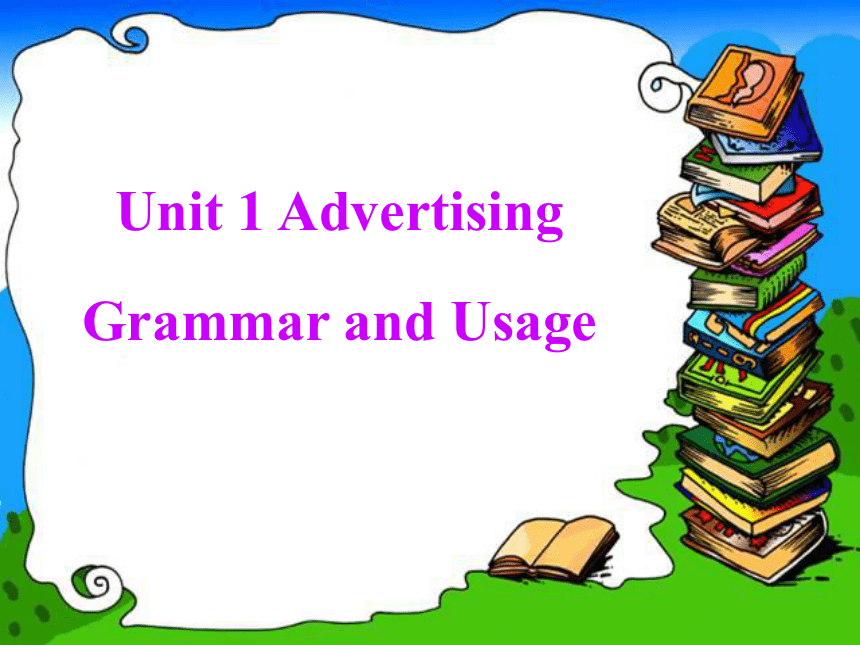

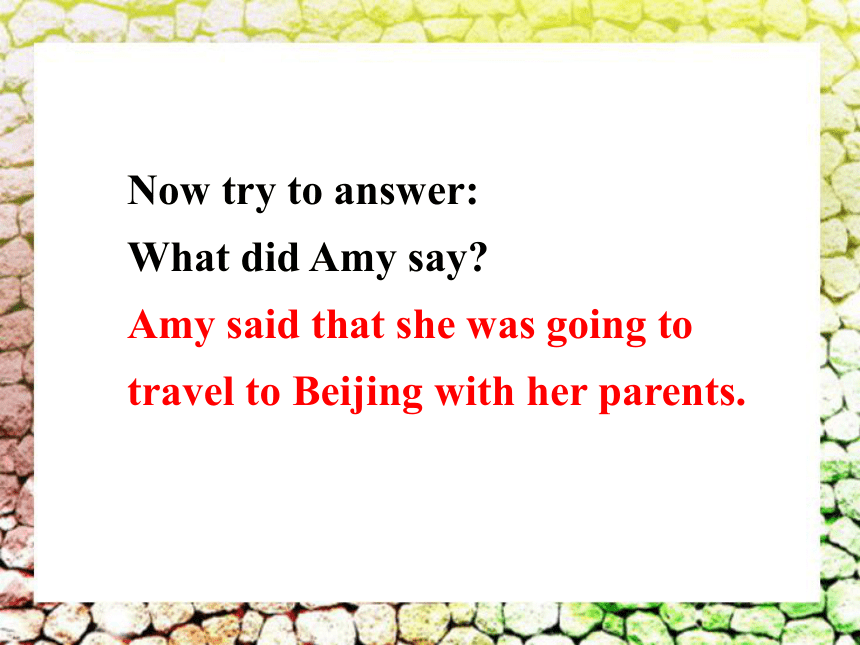
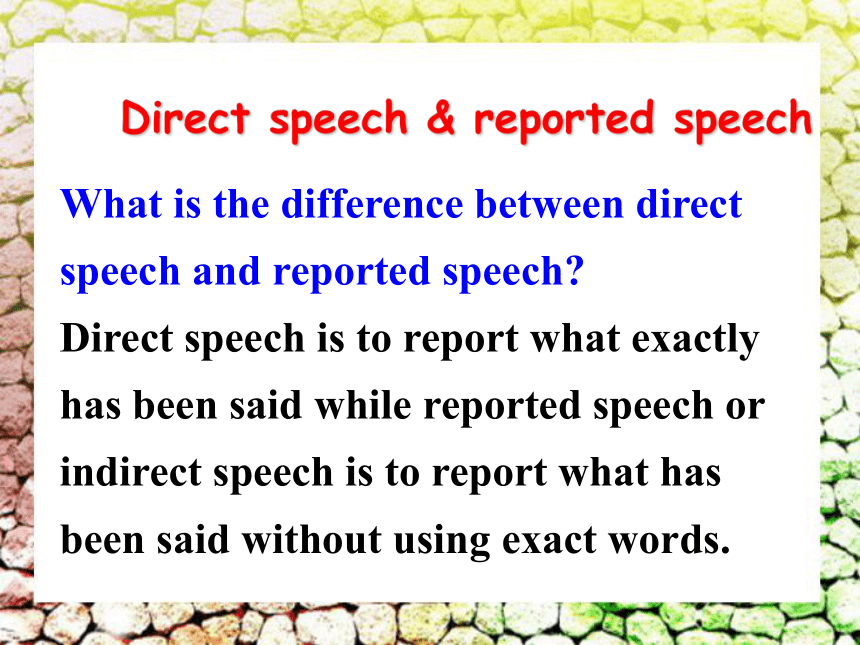
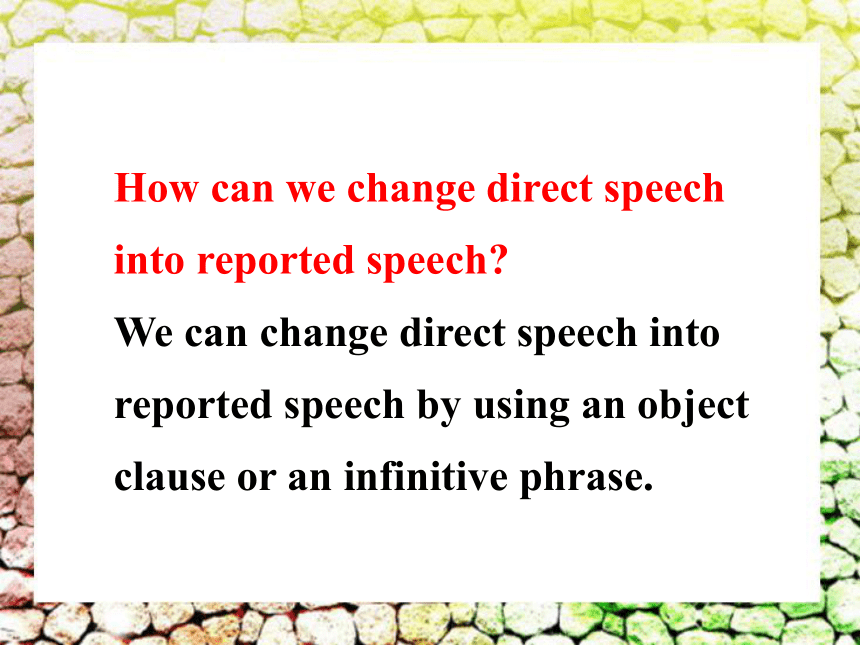


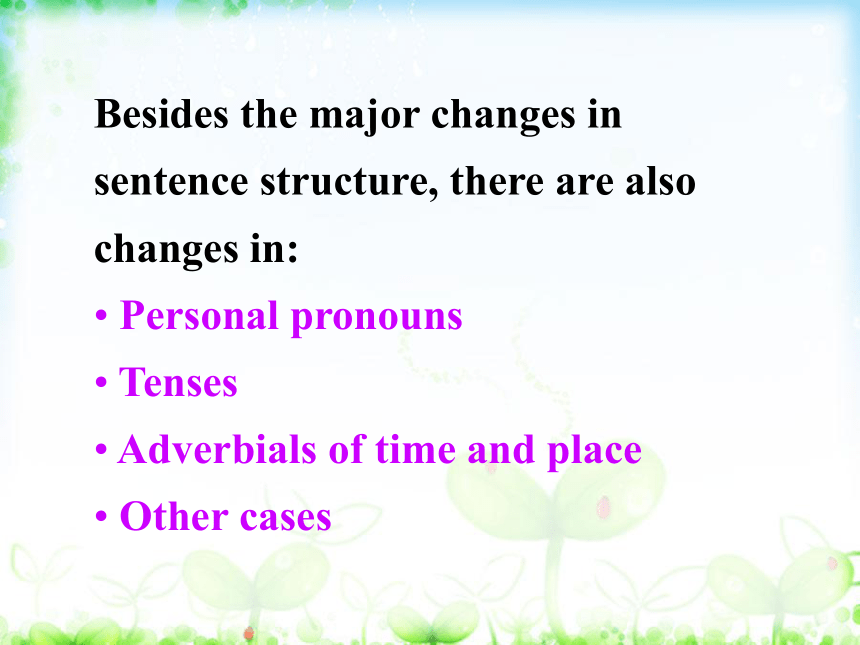
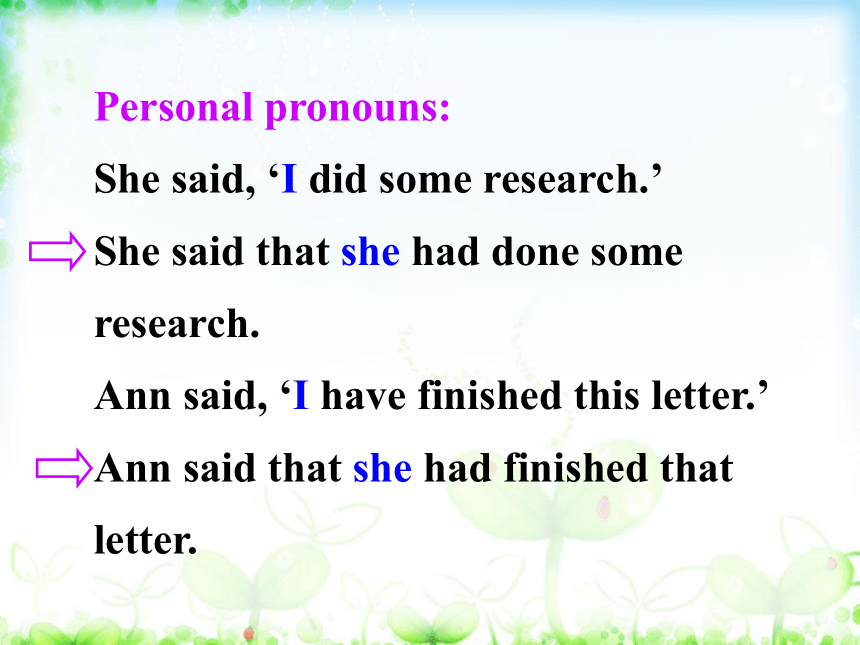

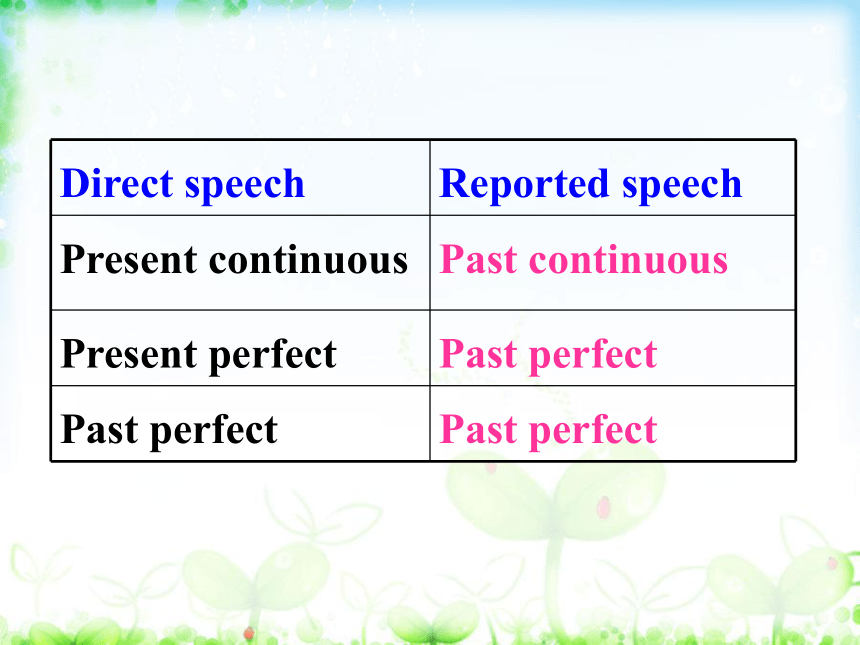
文档简介
课件45张PPT。牛津版高一 模块四
Unit 1英语课件Unit 1 Advertising
Grammar and UsageLook at the following sentences:
Tom: What are you going to do this
summer holiday?
Amy: I am going to travel to Beijing
with my parents.Lead inNow try to answer:
What did Amy say?
Amy said that she was going to travel to Beijing with her parents. Direct speech & reported speechWhat is the difference between direct speech and reported speech?
Direct speech is to report what exactly has been said while reported speech or indirect speech is to report what has been said without using exact words.How can we change direct speech into reported speech?
We can change direct speech into reported speech by using an object clause or an infinitive phrase.For example:
He said, ‘I’m used to such embarrassing comments.’
He said that he was used to such embarrassing comments.‘We must not give up in the face of pressure!’ she said.
She encouraged us not to give up in the face of pressure.Besides the major changes in sentence structure, there are also changes in:
Personal pronouns
Tenses
Adverbials of time and place
Other casesPersonal pronouns:
She said, ‘I did some research.’
She said that she had done some research.
Ann said, ‘I have finished this letter.’
Ann said that she had finished that letter.How to change the tenses:‘Light travels at a great speed,’ said Ms Li.
Ms Li said that light travels at a great speed.Tips:We do not change the tense when we report a proverb or a fact that doesn’t change over time.e.g. My teacher told me that practice makes perfect.
The teacher said that light travels faster than sound.Adverbials of time and place:
e.g. Tom said, ‘I am working here today.’
Tom said he was working there that day.The following table shows other examples:that day/yesterday, etc.the next day/the following day, etc.the day before/ the previous day, etc.the month after/the following montha week before/ a week earlier, etc.Other cases:
Some more examples of the changes:thatthosegoRead the advertisement and complete the letter on page 9.
Answers:
1. _______ 2. _______ 3. _________
4. _______ 5. _______ 6. _________
7. _______ 8. _______ 9. ________
10. ______waswould behad readthatwouldhad thoughtthatwouldthoseherReported speech:
statements, questions and imperative sentences1. Statements
We use noun clauses introduced by that
to report statements. The word that can
be omitted.
e.g. She said (that) advertisements were
almost everywhere nowadays.There are more reporting verbs other than say and tell:advise explain insist promise
announce suggest warne.g. The write explained that PSAs were
often run for free.2. Questions:We use noun clauses introduced by whether/if to report yes/no questions.
e.g. Matt asked Ann, ‘Does Jason deserve
this ward?’
Matt asked Ann whether/if Jason
deserved this award.We use noun clauses introduced by wh-words to report wh-questions.
e.g. ‘Where did you find the advertisements
for jobs abroad?’ Bill asked.
Bill asked where I had found the
advertisements for jobs abroad.3. Imperative sentences To report imperative sentences, we can use the structure: reporting verb + object +(not) + to infinitive
e.g. The candidate said to the manager, ‘Please give me five minutes for preparation.’
The candidate asked the manager to give him five minutes for preparation. There are other verbs that can be used
in this structure to report imperative
sentences:advise encourage invite recommend warne.g. ‘Don't believe every advertisement you read,’ Michelle said to me.
Michelle advised me not to believe every advertisement I read.总结如果直接引语是一个陈述句,变成间接
引语时用that引导,有时也可省略。
e.g. She said, ‘Father, the boy is very naughty now.’
She told her father (that) the boy was very naughty then.2. 如果直接引语是客观真理,变为间
接引语时,时态不变。
e.g. ‘Light travels much faster than sound,’ she said to me yesterday.
She told me the day before that light travels much faster than sound.3. 如果直接引语中有明确表示过去的
时间状语,在变为间接引语时,一
般过去时不必变为过去完成时。
e.g. He said, ‘The great inventor was born in 1884.’
He told me that the great inventor was born in 1884.4. 如果直接引语是一般疑问句,变为间
接引语时用whether/if 引导,且用陈述
句语序。
e.g. She asked me,‘ Are you the happiest
person in your family?’
She asked me whether/if I was the happiest person in my family.5. 如果直接引语是特殊疑问句,变为间接
引语时,仍用该特殊疑问词,用陈述句
语序。
e.g. She asked me, ‘When will the
advertisements be on air?’
She asked me when the advertisements
would be on air.6. 转述祈使句时,我们使用该结构: 转述
动词(ask/ tell/ order/ advise/ remind/
warn/ insist/ suggest/ invite/
encourage… ) + 宾语+ (not) to do
e.g. ‘Go and see a doctor after class,’ my
teacher said to me.
My teacher advised me to go and see
a doctor after class.Read Part A on page 11 and practise reporting questions using whether/if or wh-words.
Answers:
2. Wang Qin ________________________
__________________________________.
3. Lu Kai ___________________________
__________________________________.4. Liu Fang _________________________
_________________________________.
5. Gu Jin ___________________________asked whether/if it was easy to useRead the advertising tips on page 11 and report each of them to your boss.
Answers:
2. The expert encourages us to
_________________________________.
3. The expert recommends that
________________________________.4. The expert suggests that __________
______________________________.
5. The expert tells us to _____________
______________________________.1. recommend vt. 推荐;建议、忠告
常用结构:
recommend sth. to sb.
= recommend sb. sth. 向某人推荐某物
recommend doing sth. 建议做某事
recommend sb. to do sth. 建议某人做某事Language Pointsrecommend that … 接宾语从句用虚拟语气,should可以省略
e.g. They recommend Tom to do the job.
他们推荐汤姆去做那份工作。
The doctor recommend that she (should) stay another week in hospital.
医生建议她再留院查看一星期。2. remind v. 提醒,使想起
常用结构:
remind sb. of … 提醒某人某事……
使某人想起……
e.g. The film remind him of his happy
childhood.
这部电影使他想起他快乐的童年。 remind sb. to do sth.
提醒某人去做某事
e.g. Remind me to phone Alan before
I go out.
提醒我出去之前给艾伦打电话。选出可以填入空白处的最佳选项。
1. My classmate asked me ______.
A. had I seen the film three days ago
B. had I seen the film three days before
C. if I had seen the film three days ago
D. whether I had seen the film three
days before2. He asked me ______ with me.
what the matter is
B. what the matter was
C. what is the matter
D. what was the matter
3. My friend really didn’t know _____ to help the dying boy.
A. what he could do B. how could he do
C. whether he can do D. what can he did4. Shelly asked Andy _____ water the flowers while she was away.
A. didn’t forget to B. don’t forget to
C. not to forget to D. not forget to
5. She exclaimed (惊呼) ______.
A. what a difficult task it was
B. what it was a difficult task
C. what difficult task it was
D. what task it was difficult将下列直接引语改为间接引语。
Mother said to her little daughter, ‘The earth is not flat but round.’
Mother told her little daughter (that) the earth is not flat but round.2. He asked, ‘How are you getting along
with your studies these days, Mary
and Jane?’
He asked Mary and Jane how they were getting along with their studies those days.3. “Alice, you feed the baby,” Mother said.
Mother asked Alice to feed the baby.
4. “Let’s have a rest,” our teacher said.
Our teacher suggested (that) we have a
rest.
5. “Don’t make this kind of foolish mistake
again,” she said to me.
She told / warned me not to make that
kind of foolish mistake again.Homework To do Part C2 on page 92 of
the workbook.
To preview the task.
Unit 1英语课件Unit 1 Advertising
Grammar and UsageLook at the following sentences:
Tom: What are you going to do this
summer holiday?
Amy: I am going to travel to Beijing
with my parents.Lead inNow try to answer:
What did Amy say?
Amy said that she was going to travel to Beijing with her parents. Direct speech & reported speechWhat is the difference between direct speech and reported speech?
Direct speech is to report what exactly has been said while reported speech or indirect speech is to report what has been said without using exact words.How can we change direct speech into reported speech?
We can change direct speech into reported speech by using an object clause or an infinitive phrase.For example:
He said, ‘I’m used to such embarrassing comments.’
He said that he was used to such embarrassing comments.‘We must not give up in the face of pressure!’ she said.
She encouraged us not to give up in the face of pressure.Besides the major changes in sentence structure, there are also changes in:
Personal pronouns
Tenses
Adverbials of time and place
Other casesPersonal pronouns:
She said, ‘I did some research.’
She said that she had done some research.
Ann said, ‘I have finished this letter.’
Ann said that she had finished that letter.How to change the tenses:‘Light travels at a great speed,’ said Ms Li.
Ms Li said that light travels at a great speed.Tips:We do not change the tense when we report a proverb or a fact that doesn’t change over time.e.g. My teacher told me that practice makes perfect.
The teacher said that light travels faster than sound.Adverbials of time and place:
e.g. Tom said, ‘I am working here today.’
Tom said he was working there that day.The following table shows other examples:that day/yesterday, etc.the next day/the following day, etc.the day before/ the previous day, etc.the month after/the following montha week before/ a week earlier, etc.Other cases:
Some more examples of the changes:thatthosegoRead the advertisement and complete the letter on page 9.
Answers:
1. _______ 2. _______ 3. _________
4. _______ 5. _______ 6. _________
7. _______ 8. _______ 9. ________
10. ______waswould behad readthatwouldhad thoughtthatwouldthoseherReported speech:
statements, questions and imperative sentences1. Statements
We use noun clauses introduced by that
to report statements. The word that can
be omitted.
e.g. She said (that) advertisements were
almost everywhere nowadays.There are more reporting verbs other than say and tell:advise explain insist promise
announce suggest warne.g. The write explained that PSAs were
often run for free.2. Questions:We use noun clauses introduced by whether/if to report yes/no questions.
e.g. Matt asked Ann, ‘Does Jason deserve
this ward?’
Matt asked Ann whether/if Jason
deserved this award.We use noun clauses introduced by wh-words to report wh-questions.
e.g. ‘Where did you find the advertisements
for jobs abroad?’ Bill asked.
Bill asked where I had found the
advertisements for jobs abroad.3. Imperative sentences To report imperative sentences, we can use the structure: reporting verb + object +(not) + to infinitive
e.g. The candidate said to the manager, ‘Please give me five minutes for preparation.’
The candidate asked the manager to give him five minutes for preparation. There are other verbs that can be used
in this structure to report imperative
sentences:advise encourage invite recommend warne.g. ‘Don't believe every advertisement you read,’ Michelle said to me.
Michelle advised me not to believe every advertisement I read.总结如果直接引语是一个陈述句,变成间接
引语时用that引导,有时也可省略。
e.g. She said, ‘Father, the boy is very naughty now.’
She told her father (that) the boy was very naughty then.2. 如果直接引语是客观真理,变为间
接引语时,时态不变。
e.g. ‘Light travels much faster than sound,’ she said to me yesterday.
She told me the day before that light travels much faster than sound.3. 如果直接引语中有明确表示过去的
时间状语,在变为间接引语时,一
般过去时不必变为过去完成时。
e.g. He said, ‘The great inventor was born in 1884.’
He told me that the great inventor was born in 1884.4. 如果直接引语是一般疑问句,变为间
接引语时用whether/if 引导,且用陈述
句语序。
e.g. She asked me,‘ Are you the happiest
person in your family?’
She asked me whether/if I was the happiest person in my family.5. 如果直接引语是特殊疑问句,变为间接
引语时,仍用该特殊疑问词,用陈述句
语序。
e.g. She asked me, ‘When will the
advertisements be on air?’
She asked me when the advertisements
would be on air.6. 转述祈使句时,我们使用该结构: 转述
动词(ask/ tell/ order/ advise/ remind/
warn/ insist/ suggest/ invite/
encourage… ) + 宾语+ (not) to do
e.g. ‘Go and see a doctor after class,’ my
teacher said to me.
My teacher advised me to go and see
a doctor after class.Read Part A on page 11 and practise reporting questions using whether/if or wh-words.
Answers:
2. Wang Qin ________________________
__________________________________.
3. Lu Kai ___________________________
__________________________________.4. Liu Fang _________________________
_________________________________.
5. Gu Jin ___________________________asked whether/if it was easy to useRead the advertising tips on page 11 and report each of them to your boss.
Answers:
2. The expert encourages us to
_________________________________.
3. The expert recommends that
________________________________.4. The expert suggests that __________
______________________________.
5. The expert tells us to _____________
______________________________.1. recommend vt. 推荐;建议、忠告
常用结构:
recommend sth. to sb.
= recommend sb. sth. 向某人推荐某物
recommend doing sth. 建议做某事
recommend sb. to do sth. 建议某人做某事Language Pointsrecommend that … 接宾语从句用虚拟语气,should可以省略
e.g. They recommend Tom to do the job.
他们推荐汤姆去做那份工作。
The doctor recommend that she (should) stay another week in hospital.
医生建议她再留院查看一星期。2. remind v. 提醒,使想起
常用结构:
remind sb. of … 提醒某人某事……
使某人想起……
e.g. The film remind him of his happy
childhood.
这部电影使他想起他快乐的童年。 remind sb. to do sth.
提醒某人去做某事
e.g. Remind me to phone Alan before
I go out.
提醒我出去之前给艾伦打电话。选出可以填入空白处的最佳选项。
1. My classmate asked me ______.
A. had I seen the film three days ago
B. had I seen the film three days before
C. if I had seen the film three days ago
D. whether I had seen the film three
days before2. He asked me ______ with me.
what the matter is
B. what the matter was
C. what is the matter
D. what was the matter
3. My friend really didn’t know _____ to help the dying boy.
A. what he could do B. how could he do
C. whether he can do D. what can he did4. Shelly asked Andy _____ water the flowers while she was away.
A. didn’t forget to B. don’t forget to
C. not to forget to D. not forget to
5. She exclaimed (惊呼) ______.
A. what a difficult task it was
B. what it was a difficult task
C. what difficult task it was
D. what task it was difficult将下列直接引语改为间接引语。
Mother said to her little daughter, ‘The earth is not flat but round.’
Mother told her little daughter (that) the earth is not flat but round.2. He asked, ‘How are you getting along
with your studies these days, Mary
and Jane?’
He asked Mary and Jane how they were getting along with their studies those days.3. “Alice, you feed the baby,” Mother said.
Mother asked Alice to feed the baby.
4. “Let’s have a rest,” our teacher said.
Our teacher suggested (that) we have a
rest.
5. “Don’t make this kind of foolish mistake
again,” she said to me.
She told / warned me not to make that
kind of foolish mistake again.Homework To do Part C2 on page 92 of
the workbook.
To preview the task.
